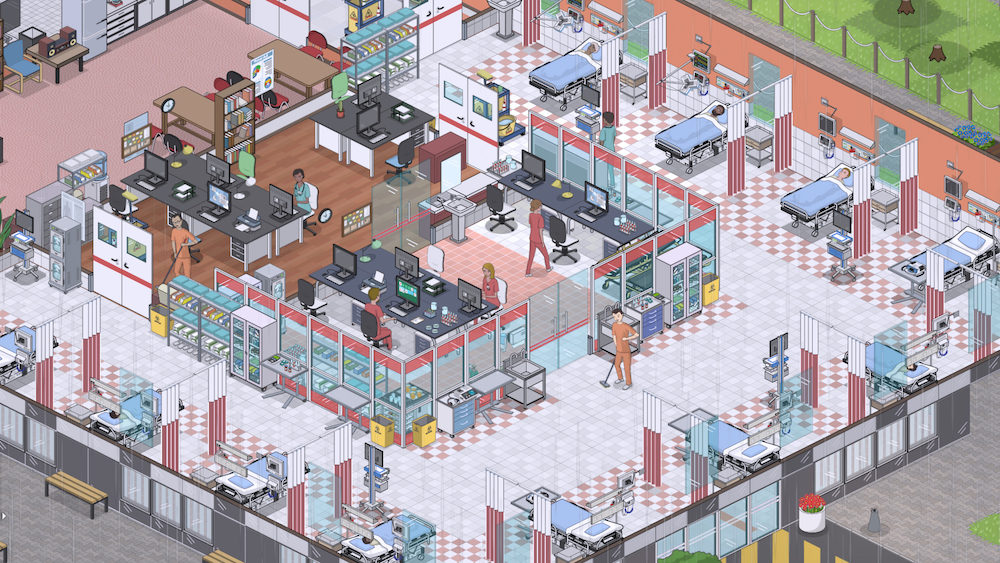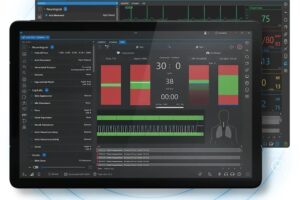Project Hospital is the “Sim City” of Hospital Simulation Games
Recently Ian Boudreau of Vice wrote about his experience playing Project Hospital with his father, an emergency medicine physician who ran ERs for years. Project Hospital is a serious management simulation that wants to realistically show players something about how hospitals work, and so today we take a closer look at the game, Ian and his father’s experience, and consider what it all means for healthcare simulation.
“Project Hospital is A Great Way to Understand Our Broken Healthcare System” Vice Article Excerpt
“But the more I talked with him, the more I felt a creeping unease both at how the supposedly gamey elements of Project Hospital mirror elements of the real U.S. healthcare system, particularly in the structural incentives to do more, charge more, bill more. That’s how management sims like Project Hospital or Parkitector Railroad Tycoon work: you want to do as many things as you can and make sure those things are as expensive as possible. You’re creating efficiencies in the physical space available to you in order to extract the highest possible profit per hour. This loop keeps the game engaging: It’s a system that you can learn, develop, and master, with difficulty and complexity increasing as the scenarios get larger and new elements are introduced. But Project Hospital is a game, and the healthcare industry is supposed to keep people alive. And that makes the similarities between the two at first fascinating, and then unnerving. (Read Ian’s full Vice article here).
Sponsored Content:
Project Hospital is full of little details drawn from the everyday practice of medicine. Patients show up with sprains, cuts, or hayfever. I’ve had several come in suffering from Raynaud’s Syndrome, which is a condition that causes the blood vessels in the hands and feet to constrict, making the fingers and toes painfully cold. As a management sim, Project Hospital also wants to recreate the triage pipeline you’d find in a real hospital. There’s a complex flowchart you can pull up that details the path patients move along from intake to hospitalization, transfer, or discharge.
You need to make sure each step along the way, and each department they might need to visit, is properly staffed, and that those staffers—doctors, specialists, techs, nurses, and building maintenance crew—all have physical places to work and do their jobs, and that they aren’t tripping over each other along the way. In Building Mode, you can add floors and elevators, parking areas and trauma bays. It’s satisfying in that calming way games like Rollercoaster Tycoon so often are, but with a welcome seriousness about its subject matter.
Patients arrive at your hospital carrying a policy from one of a number of insurers, which vary in quality. This is represented by a percentage: a low-quality insurer pays 70 percent of the “retail” price of a procedure, while a higher-quality insurer will pay something like 120 percent. You can decide which insurers you want to accept, which is a way to control the flow of patients into your hospital. In the game, uninsured patients do not exist.
Sponsored Content:
Dad and I talked about the business side of hospitals long after I’d closed the laptop I had been using to show him Project Hospital. He explained how all of his hospital’s operating budget is based on what it bills. That’s how it works in the game, too: You’re trying to perform and bill for the most procedures possible while keeping your overhead as low as possible. There’s the option to take out a loan (with interest), but generally speaking you’re trying to stay in the black by reducing your operational costs and increasing the number of patients you treat.
Project Hospital, like many of the medical dramas that inspire it , exists in a universe where otherwise healthy people are fully treated within the confines of a single visit to a single facility. The long-term costs paid by the patient are unseen. Nor is the emergency room the place where doctors confront the broken reality of a healthcare system built on the quicksand of the insurance industry. That happens offstage, dispassionately, when a letter from an insurer or an operator on the phone lets someone know that a necessary procedure for recovery or treatment has been denied or was never covered in the first place. Meanwhile, your business is chugging along, blissfully unaware of the human misery that exists all beyond the margins of the medical simulation.”
About Project Hospital
Project Hospital lets you build and manage every detail of your very own hospital and also diagnose and treat individual patients. The developers aim to create a game both friendly to casual players and providing a lot of depth for experienced gamers. It features different departments, over a hundred medical conditions based on real world diseases, injuries and a detailed diagnosis process.
In this game you can become an ace doctor, an aspiring architect and a successful manager at the same time. Design your very own hospital, tweak every detail or use one of the predefined models and just jump to the doctor’s duty. Contract different insurance companies to gain access to patients with interesting medical conditions, perform examinations, laboratory tests and use various equipment to solve the diagnostic puzzles. Hospitalize your patients, perform surgery and more!
Games in Healthcare Simulation
Video games, often in our field referred to as ‘Serious Games’, offer a unique way for learners to experience various aspects of healthcare practice. Numerous Virtual Reality applications are now providing hands-on clinical practice training to learners around the world, from patient communication practices to patient assessment, surgical interventions and more. The reality is that: the senior generation of healthcare educators continue to retire in droves, the number of practitioners needed to care for an expanding population is growing, and the requirement to train new professionals as quickly and affordably as possible will always exist. All of those factors sum up to one major bottom line from our perspective, that more video serious games are coming to healthcare in the very near future. One day playing such video games will be required simulated learning — and we don’t think that day can come fast enough.
Do you utilize Project Hospital at your clinical simulation program or other Serious Games? Leave us a comment below and share about your gaming experiences in healthcare education and training!
Learn More About & Play Project Hospital Here!
Lance Baily, BA, EMT-B, is the Founder & CEO of HealthySimulation.com, which he started while serving as the Director of the Nevada System of Higher Education’s Clinical Simulation Center of Las Vegas back in 2010. Lance is also the Founder and acting Advisor to the Board of SimGHOSTS.org, the world’s only non-profit organization dedicated to supporting professionals operating healthcare simulation technologies. His co-edited Book: “Comprehensive Healthcare Simulation: Operations, Technology, and Innovative Practice” is cited as a key source for professional certification in the industry. Lance’s background also includes serving as a Simulation Technology Specialist for the LA Community College District, EMS fire fighting, Hollywood movie production, rescue diving, and global travel. He and his wife Abigail Baily, PhD live in Las Vegas, Nevada with their two amazing daughters.
Sponsored Content:




















